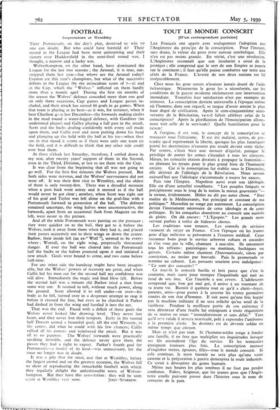FOOTBALL
Impressions at Wembley
THAT Portsmouth, on the day's play, deserved to win no one can doubt. But who could have foretold it? Their record in the League had been most uninspiring and their victory over Huddersfield in the semi-final round was, I thought, a narrow and a lucky win.
Wolverhampton, on the other hand, have dominated the League for the last two seasons ; the Arsenal, it is true, out- stripped them last year—but where are the Arsenal today? Everton are this year's champions, but what of the successive defeats in the League (by the miraculous score of 7—o) and in the Cup, which the " Wolves " inflicted on them hardly more than a month ago? During the first six months of the season the Wolves' defence conceded more than one goal on only three occasions, Cup games and League games in- cluded, and their attack has scored 86 goals in 4o games. When that team is playing at its best—as it was, for instance, when it
beat Charlton 4—o last December—the forwards making circles in the mud round a water-logged defence, with Gardiner (an underrated player) and Galley playing a full part in the attack, Scott and the backs dealing confidently with every call made upon them, and Cullis ever and anon putting down his head and plunging up the field with the ball at his toe—when they are in that mood it seems as if there were only one team on the field, and it is difficult to think that any other side could ever beat them.
At three o'clock last Saturday, therefore, I settled down in my seat, after twenty years' support of them in the Second, even in the Third, Division, at last to see them win the Cup.
It was clear from the beginning that all was not going to go well. For the first five minutes the Wolves pressed. But both sides were nervous, and the Wolves' nervousness did not wear off. It was their first visit to Wembley, and the oldest of them is only twenty-five. There was a dreadful moment when a pass back went astray and it seemed as if the ball would never be got clear ; another, when Scott was right out of his goal and Taylor was left alone on the goal-line with a Portsmouth forward in possession of the ball. The defence remained uncertain, the wing halves were unconstructive, the forwards, apart from an occasional flash from Maguire on the left, were never in the picture.
And all the while Portsmouth were putting on the pressure ; they were quicker on to the ball, they got to it before the Wolves, took it away from them when they had it, and placed their passes accurately out to their wings or down the centre. Barlow, their inside left (an ex-" Wolf "), seemed to be every- where ; Worrall, on the right wing, perpetually threatened danger. If ever the ball was cleared into the Portsmouth half the backs or the halves pounced upon it and initiated a new attack. Goals were bound to come, and two came before half-time.
For any other side the handicap might have been insuper- able, but the Wolves' powers of recovery are great, and when Cullis led his men out for the second half my confidence was still alive. Immediately the tragic and final blow fell. Before the second half was a minute old Barlow tried a shot from some way out. It seemed to roll, without much power, along the ground. Scott allowed it to roll under—or over—his body as he fell, turned over in a desperate attempt to stop it before it crossed the line, but even as he clutched it Parker had dashed in from the wing and hustled it into the net.
That was the end. Faced with a deficit of three goals the Wolves never looked like drawing level. They never lost heart, and they never lost their tempers. Early in the second half Dorsett scored a beautiful goal; till the end Westcott, in the centre, did what he could with his few chances; Cullis rallied all his powers and reinforced the attack. But it was all to no purpose. The Wolves' forwards were practically speaking invisible, and the defence never gave them the passes they had a right to expect. Parker's fourth goal for Portsmouth—a model of its kind—was unnecessary, for the issue no longer was in doubt.
It was a pity that for once, and that at Wembley, before the largest crowd and on the greatest occasion, the Wolves fell so short of reproducing the remarkable football with which they regularly delight the unfashionable town of Wolver- hampton. But they have this consolation : they will be seen














































 Previous page
Previous page